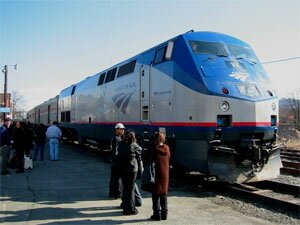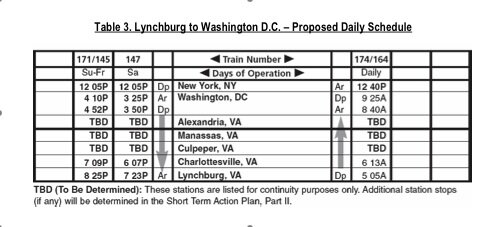NEWS- New NYC train: ‘As soon as possible,' Amtrak seeks new service

So will it be called the Charlottesvillian? Or the Lynchburger?
2003 PHOTO BY HAWES SPENCER
Charlottesville's #1 passenger rail promoter was hoping that Amtrak would take the idea of a daily train to Washington and roll with it. But Amtrak went further than Meredith Richards was expecting. The quasi-public passenger rail company released a report (PDF-2.2MB) Tuesday, January 29, signaling its desire to add a new daily train that would roll not just to Washington but all the way to New York. And back.
"I'm just thrilled," says Richards, who heads the cvillerail.org advocacy group. "Amtrak said we're the easiest corridor to add service to and at the lowest cost and in the shortest time, and they said, ‘Go for it.'"
The proposed train– whose southern terminus would be an hour south of Charlottesville in Lynchburg– would increase the number of passenger trains stopping in Charlottesville by about 70 percent. According to the suggested schedule, travelers could board in Charlottesville at 6:13am, arrive in Washington by 8:40am, and reach New York's Penn Station by 12:40pm. The southbound trip would leave New York at 12:05pm and pull into Charlottesville at 7:09pm. (It's an hour faster on Saturdays.)
All this convenience comes at a cost, however. Although widely touted as the greenest form of inter-city travel, rail doesn't offer a built-in subsidy (such as the fuel or gate taxes that cover the costs of highways and airports). And based on an initial ridership level of 33,100 passengers, Amtrak estimates the needed annual subsidy would be about $1.9 million. Where will that come from?
Richards isn't sure. On the day after the report was released, she found herself in Richmond lobbying to ease the rules for tapping into the state's new $23 million dedicated rail fund. Yet she thinks the bill she supports, S.B. 371, won't win the support of the current administration. She's cautiously holding out hope that the state's own rail plan, a consultant-written document due for release this summer, can somehow urge officials to open state coffers.
If she succeeds, Virginia would join 14 other states that have recently begun subsidizing Amtrak rail service based on the belief that trains cut emissions, reduce congestion, and even stimulate pedestrian-oriented development.
Subsidies, however, can create unhappiness, particularly when private enterprise has already leapt into the breach. Four years ago, a pair of Charlottesville businesspeople launched the Starlight Express, a Charlottesville-New York service that has grown from a lone weekly round-trip motorcoach to about 10 departures and arrivals each week.
"I'm not going to worry myself about it," says David New, co-founder of the Starlight Express. "Our whole country lacks adequate public transportation, so I kind of welcome it in the big scheme of things."
Wrinkles in the Amtrak plan remain. For starters, the report also names another "short-term action opportunity": a Washington-Newport News link that's estimated to carry more passengers and would compete for equipment and funding with the Piedmont corridor. However, only the route through Charlottesville won Amtrak's recommendation that the state start "as soon as possible."
In other words, says Richards, "Amtrak is ready when the state is ready to go." #

There'd be two new stops each day.
AMTRAK